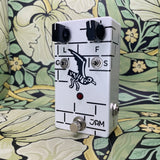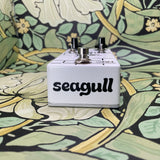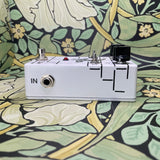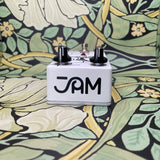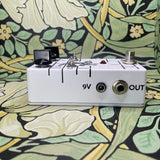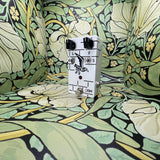Choose between the distinct "seagull" sound heard in Pink Floyd's "Echoes" or vocal, vintage cocked-Wah tones, courtesy of the celebrated Red Fasel inductor also found in our Wahcko.
We hope the Seagull inspires you to create unique sonic moments and have a wah-nderfull time while you are at it!
2 PEDALS IN 1
Outside of the traditional seagull effect you are able to access a full range of cocked-wah sounds. Pair with your favourite Fuzz / OD / Distortion boxes to add the legendary Wah filter and cut through the mix with tons of vintage mid-range sass!
MORE CONTROL
All of the onboard controls are shared amongst both modes (seagull or cocked wah)
• L: controls the output level
• F: fine-tunes the frequency
• S: 3-way toggle-switch that selects between 3 distinct sweep ranges
• C: 2-way toggle-switch that selects between seagull (right) and cocked wah (left) modes
• Footswitch: Keep pressed for longer times to momentarily engage (press to engage, release to disengage) or press and release instantaneously for traditional ON or OFF operation.
Please follow these steps to make sure you properly operate and control the Seagull:
• Make sure your guitar has passive pickups
• Make sure there are no buffered bypass pedals between your guitar and the Seagull
• Engage the effect, when you do:
• Adjust the output volume to your taste
• Turn your guitar’s volume knob all the way up.
• You change the pitch by manipulating your guitar’s tone pot.
• You can select different pickup settings on your guitar to alter the fundamental pitch
• Long delay repeats and/or lush reverb are recommended!
A little background history on the Seagull from www.gilmourish.com:
"David Gilmour explains in an interview with Guitar Player (January 09):
"We discovered it as the result of a serendipitous accident that happened in about 1969 or 1970, when a roadie had plugged the wah in the wrong way, and I stomped into it and got this incredible screaming noise."
The brilliance of this effect isn't really the effect in it self but the fact that David went ahead and explored how he could tame and integrate the effect in a song after obviously having heard something that must have sounded quite horrible. Actually, David employed the effect long before Pink Floyd wrote Echoes. It can be heard during early live versions of the unreleased song Embryo.







